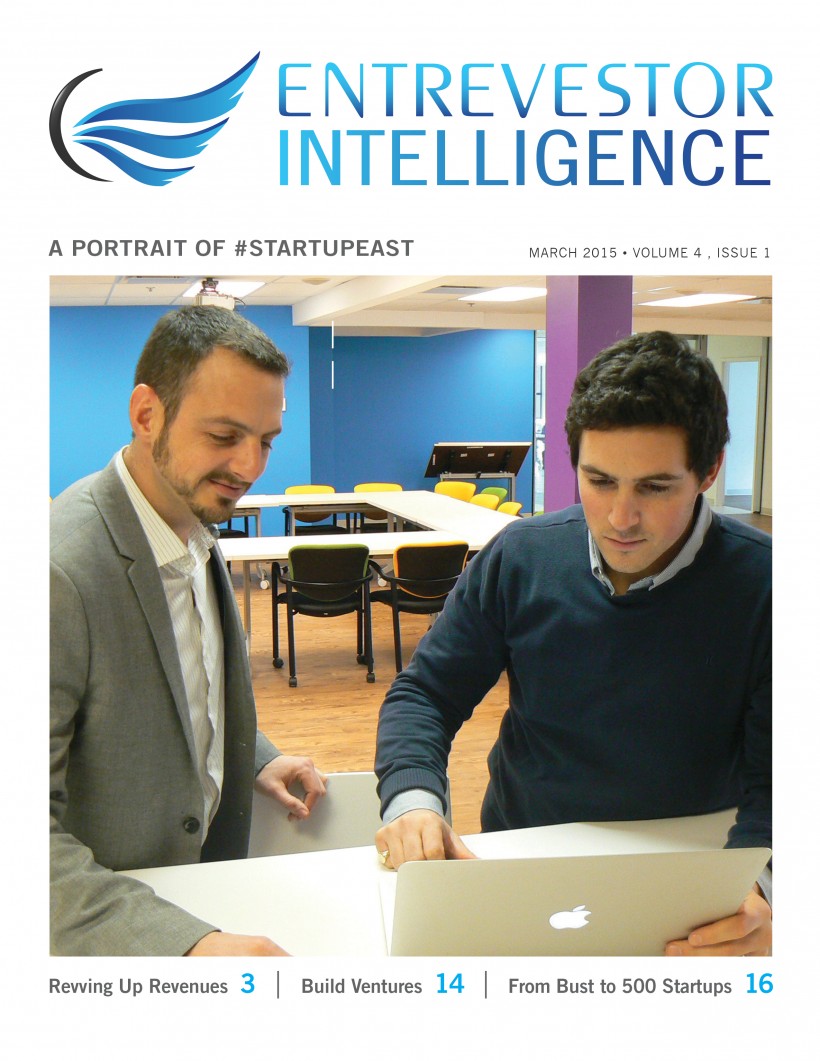
Entrevestor Intelligence: An in-depth portrait of #Startupeast in 2014.
Additional Information:
- A Snapshot of our Data
Startups in Atlantic Canada focused more on selling than hiring in 2014, and business specialists believe the region’s high-growth companies are better off as a result.
Today, we’re releasing our first Entrevestor Intelligence report of 2015, including the results of our latest survey of the region’s startups.
The companies that shared data with us revealed that their total revenues increased 36.5 per cent over last year. That comes after revenues increased by 30 per cent in 2013.
Meanwhile, employment at startups in the region continues to grow but at a slower pace. Our most recent survey found that employment at the responding startups increased by 9.4 per cent — not bad, but falling far short of the dizzying 43 per cent growth of 2013.
“The startup sector not adding jobs as quickly as it has in the past likely indicates productivity improvements,” said Gary Dinn, who became CEO of the regional accelerator Propel ICT late last year.
“We will therefore not add jobs in lockstep with revenue growth, as with older resource-based industries.”
Several business leaders echoed the sentiments of Saeed El-Darahali, CEO of SimplyCast, who said in an interview that companies are “focusing on a slow burn so you can get to break-even all the quicker.” That, he said, is a healthier process than simply focusing on job growth.
In the first two months of this year, Entrevestor identified 287 startups in the region and surveyed as many as we could. We received 147 responses by the deadline for this report, though some respondents declined to give sensitive information, such as sales or funding details.
Combining this data with our reporting from around the region, our first Entrevestor Intelligence report this year gives a detailed picture of what’s going on in this exciting segment early in 2015. We’ve had help.
It’s difficult to pick out trends from revenue data. But there were more companies moving into the middle band of healthy-if-not-spectacular revenue and out of the pre-revenue band.
In the latest survey, 21 per cent of the respondents were in the $100,000-$1 million revenue band, compared with 18 per cent in 2013. At the lower end of the spectrum, 48 per cent of the companies had revenue below $10,000 this year, down from 53 per cent a year earlier.
Here’s some other good news about revenues: almost four-fifths of the sales come from outside Atlantic Canada. Only 22 per cent of the startup revenue comes from Atlantic Canadian customers. Almost three times that amount (64 per cent) comes from clientele outside Canada. The recent growth of startups in the region would be a hollow victory if the growth were not based on exports.
In funding, the biggest venture capital deal last year was Spectrum Equity’s $60-million investment into Verafin of St. John’s, N.L. (We group private equity deals, such as the Spectrum funding, in with venture capital.)
But it was only part of the story. Overall, 2014 was a record year with $84.4 million of institutional investment into Atlantic Canadian startups, up 170 per cent from a year earlier.
If you strip out the Spectrum funding, the 2014 total falls to $24.4 million. But if we take out that deal, we should also exclude Imperial Capital’s $17 million funding of STI Technologies in 2013, in which case the 2013 total would be $13.8 million. That still means VC funding increased by 77 percent in 2014.
In the ecosystem for startups, the big advance last year was the broadening of the Propel ICT regional accelerator. It went from a cohort of six teams in the spring to a multi-location cohort of more than 20 in the autumn.
There was also a strengthening of the pre-accelerator groups that feed into Propel. The Mashup Lab movement in Nova Scotia, Vennture Garage in Moncton, Ignition in Prince Edward Island and several initiatives in the Sydney area are getting teams ready for accelerators and the market.
Also in this issue, we take a look at the challenges of the startup life. Our whole community is learning, (as if they didn’t know it before) that this startup stuff is hard. If it weren’t, we’d all be listed on Nasdaq by now, or maybe the NYSE. Atlantic Canadian founders are becoming more sober in their judgments, which is probably why they hired fewer people than they’d expected last year.
There were about 43 startups that shut down in the region last year, and we wanted to look at the issue of failure. So we talked with Nathan Armstrong, who closed down Hyton Innovation last summer. And we profiled Yves Boudreau, whose first company went bankrupt. Boudreau is now in 500 Startups in San Francisco with his second.
Entrevestor receives financial support from government agencies that support start-up companies in Atlantic Canada. The sponsoring agencies play no role in determining which companies are featured in this column nor do they have the right to review columns before they are published.
Ian
Thu, March 12, 2015
Excellent article.
Nice to see startups focused on sales and customer acquisition. In the long run this will produce a stronger healthier ecosystems and the jobs will follow.